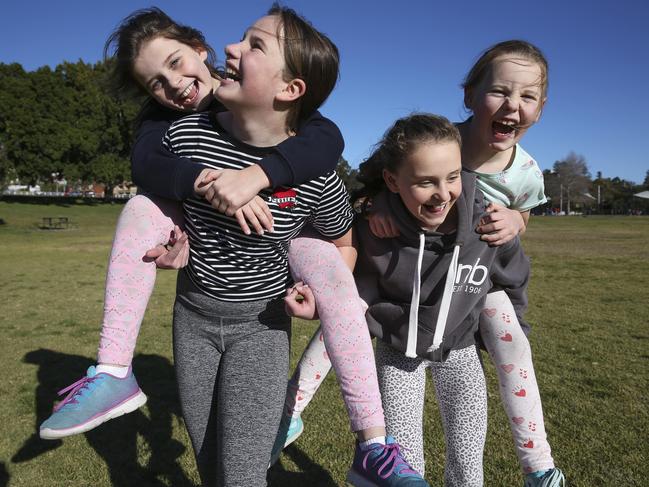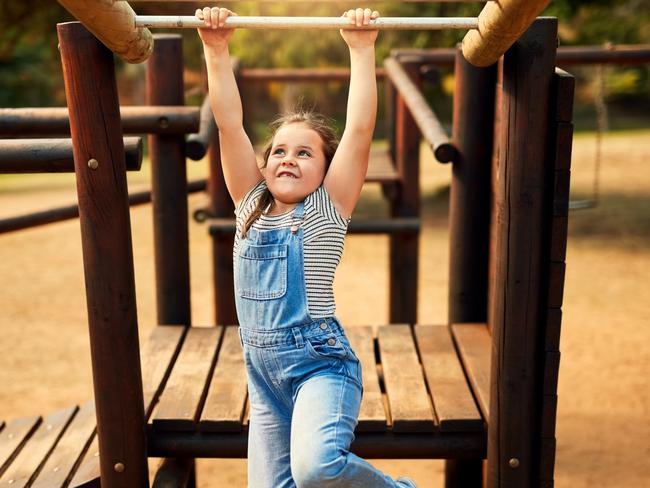School children to be weighed, measured in new obesity scheme
EVERY Australian child’s height and weight would be recorded in primary school unless parents chose to “opt out” under a drastic proposal to tackle Australia’s obesity crisis.
School Life
Don't miss out on the headlines from School Life. Followed categories will be added to My News.
EVERY Australian child’s height and weight would be measured and recorded in primary school unless parents chose to “opt out” of the checks under a drastic proposal to tackle Australia’s worsening obesity crisis.
Checks would be done at school for all children in Year 1 and Year 6 at minimum, or every two years at best, to better help the government understand the real scope of Australia’s “obesity epidemic”.
It’s part of a plan proposed by the Global Obesity Centre (GLOBE) to tackle the problem in Australia, which now ranks sixth highest for an overweight or obese population behind Mexico, the United States, New Zealand, Finland and Chile.
GLOBE predicts the real number of overweight Aussies is likely to be even higher than shocking official figures, which show one in five children aged two to four are now overweight and one in four children aged five to 17 are overweight or obese.

The centre, which collaborates with the World Health Organisation and is based at Deakin University, is calling for compulsory height and weight checks for children unless parents “opt out” to determine the real scale of the crisis in a submission to the federal government’s inquiry into the nation’s “obesity epidemic”.
Federal Health Minister Greg Hunt confirmed to News Corp the government would consider the proposal.
He said the primary responsibility for children’s health rested with parents and the states who run the schools but that he would refer the proposal to the joint State and Commonwealth body, the Australian Health Ministers’ Advisory Council, to consider and provide advice.
“The importance of exercise and good eating for kids cannot be underestimated in giving them a lifelong platform to good health,” he said.
“Being healthy as a child sets you up for life and we encourage children and parents to work together on adopting healthy lifestyles.”
But Health at Every Size Australia, a group which lobbies for a focus on healthier lifestyle behaviours not body shape or size, says the checks could backfire.
“We know without a doubt when kids are given the impression that weight control is important that that actually leads to worse eating habits — eating habits that are destructive, eating disorders, which are deadly for some, and ironically increased weight,” HAES Australia spokeswoman Fiona Willer said.
Ms Willer told News Corp the nation’s current model of analysing population trends using random samples of Australians and longitudinal studies was sufficient.
“Doing it to everyone is very heavy handed, unnecessary and will cause more entrenchment of stigmatisation of high body weights in the population,” she said.

GLOBE’s Professor Steve Allender said the checks were necessary as obesity had become a multi-billion dollar crisis that affected two-thirds of adults.
“It’s time we had better information to make good decisions about improving the health of our kids for the future,” he said.
“There are probably communities in Australia who are doing a really good job of improving the health of our kids and we can’t learn from them and improve the health of the whole nation unless we understand who is doing well.”
GLOBE has trialled a version of the checks in Victoria for about 20,000 students over the past few years.
Prof Allender said the Victorian trial, and similar models already in place in Britain and the US, proved it could be rolled out in a safe way that didn’t lead to “any potential problems around body image or peer relationships”.
He added that the data would help government deliver resources to tackle obesity to areas with the greatest need.

HOW WOULD IT WORK
Height and weight checks would be done at schools by medical professionals and the data collected for research and policy purposes.
It would be a simple check on the scales and a height measurement, rather than waist measurements.
Children would not be told their results, to avoid kids comparing results in the schoolyard, and the statistics would not be connected to a child’s name but rather used as part of an age group for broader analysis.
It would be similar to the UK’s model, launched in 2006, where checks are done at schools by National Health Service professionals.
But the UK’s model goes even further in that parents are notified about the checks, then sent their child’s results by mail.
Parents can then chose whether they want to tell their child the results and seek a GP or school nurse’s help if they have any concerns.
Public Health Association of Australia chief executive Terry Slevin welcomed the proposal if the checks were conducted in a “very routine” way.
“It can’t be about stigmatising or embarrassing kids. It has to be about getting accurate information about a very real public health problem,” he said.
Mr Slevin added that Australia’s obesity crisis had reached such a scale that it was time for policy makers to make difficult decisions and “stop vested industry interests from derailing important reforms that are being adopted around the world”.
Obesity Policy Coalition Executive Manager Jane Martin also welcomed the proposal, saying: “We don’t have enough data and we need to do this regularly over time to really know what’s happening in the population to be able to target groups and have a sense of what policies are working and which ones aren’t.”
OTHER WAYS TO TACKLE OBESITY
GLOBE is also calling for:
— a new tax on sugary drinks that would raise their price by 20 per cent
— restrictions on advertising for unhealthy food and drinks on social media platforms like Facebook and YouTube
— restrictions on unhealthy food advertising on free-to-air TV to be extended to 9.30pm
— a ban on unhealthy foods at the ends of aisles and check-outs in supermarkets
— and for the Health Star Rating System to be improved and made mandatory by July 2019, among other measures from the Obesity Policy Coalition’s 2017 Tipping the Scales report.
Hearings for the government’s obesity epidemic inquiry begin next month.
Free TV Australia opposed more regulation for unhealthy food advertising in its submission, arguing there was “no definitive evidence” that showed it would materially impact child obesity rates and that children today were more likely to be watching unregulated platforms like YouTube than prime time television.
